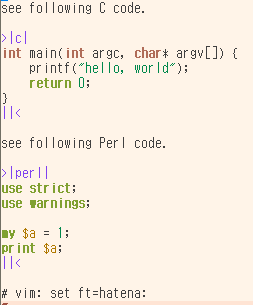追記
事情が変わった!(髭男爵)
変わってなかった...orz
詳細は下記。
おもしろい。
static - 素人がプログラミングを勉強するブログ
var counter = function () {
var static = /(^o^)/;
return ('i' in static)? ++static.i:
static.i = 0;
};
console.log(counter());
console.log(counter());
console.log(counter());
console.log(counter());
http://d.hatena.ne.jp/javascripter/20090113/1231863436
正規表現リテラルがコンパイル時に生成され、静的保持される特性を利用したカウンタ。
でも使わない。気持ちワルイ!苦笑
皆、思いつくだろうけど私はやっぱりこう書く。
var counter = (function() {
var static = 0;
return function() {return static++};
})();
ちなみにベンチを取ってみた。
if (typeof console == 'undefined') console = {log:print};
var counter1 = function () {
var static = /(^o^)/;
return ('i' in static)? ++static.i:
static.i = 0;
};
var counter2 = (function() {
var static = 0;
return function() {return static++};
})();
var start;
start = new Date().getTime();
for(var n = 0; n < 10000000; n++) counter1();
console.log(new Date().getTime() - start)
start = new Date().getTime();
for(var n = 0; n < 10000000; n++) counter2();
console.log(new Date().getTime() - start)
Windows XP、P4 3GHz CPU、1G Mem。
tracemonkey : JavaScript-C 1.8.0 pre-release 1 2007-10-03
6515
5500
v8 : V8 version 0.3.4 (internal)
1558
383
ま、やっぱりね...というところ。
結論
V8はえーーー!
追記
os0xさんから
var counter1 = function () { var static = /(^o^)/; return ++static.i || (static.i=0); }; こうすれば差は縮まる http://la.ma.la/blog/diary_200705301141.htm
とブックマークコメントを貰った。
counter3としてベンチに追加した
所、結果が変わった。
if (typeof console == 'undefined') {
if (typeof print == 'function') console = {log:print};
else if (typeof WScript != 'undefined') console = {log:function(s){WScript.StdOut.WriteLine(s)}};
else console = {log:alert};
}
var counter1 = function () {
var static = /(^o^)/;
return ('i' in static)? ++static.i:
static.i = 0;
};
var counter2 = (function() {
var static = 0;
return function() {return static++};
})();
var counter3 = function () {
var static = /(^o^)/; return ++static.i || (static.i=0);
};
var start;
start = new Date().getTime();
for(var n = 0; n < 10000000; n++) counter1();
console.log("counter1:" + (new Date().getTime() - start))
start = new Date().getTime();
for(var n = 0; n < 10000000; n++) counter2();
console.log("counter2:" + (new Date().getTime() - start))
start = new Date().getTime();
for(var n = 0; n < 10000000; n++) counter3();
console.log("counter3:" + (new Date().getTime() - start))
さらにベンチにwindows scripting hostも足してみた。
tracemonkey : JavaScript-C 1.8.0 pre-release 1 2007-10-03
counter1:1624
counter2:381
counter3:529
v8 : V8 version 0.3.4 (internal)
counter1:1610
counter2:403
counter3:665
cscript : Microsoft (R) Windows Script Host Version 5.6
counter1:107282
counter3:44016
counter2:51297
おぉぉぉぉぉぉぉぉぉぉ!!!!なんと
正規表現オブジェクトの方が速いではないか!!!
詳細はos0xさんか何方かが書いてくれるとして...
失礼しました!!!
上の結果が正しいです。
結論
windows scripting hostおせーーー!






